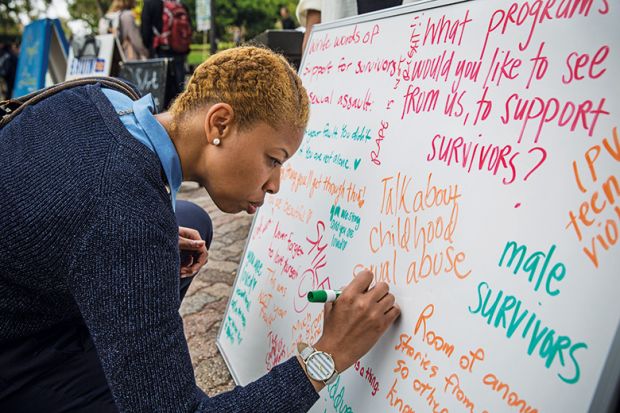Everyone lies about sex, though maybe every generation lies about sex differently,” says Laura Kipnis, adding that each era is almost right to believe “its own sexual narrative”, since it does largely determine the way sex is experienced. She is a self-proclaimed left-wing feminist, author of outspoken books on love and the sexes, and professor of media studies at Northwestern University in Illinois. Her latest polemic attacks the recent sexual narrative in American universities, which, she argues, reverses feminist advances, infantilises female students, foments witch-hunts and stifles spontaneity, joy and intellectual debate.
Product and also promoter of this “sexual paranoia” is Title IX, a law introduced in the Education Amendments Act of 1972, which, since 2011, has been extended beyond its original remit of tackling gender discrimination into penalising anything that might be construed as sexually threatening to students. Professors are warned to avoid “unnecessary references to parts of the body”, risqué jokes and “poems with sexual content” (a creative writing teacher was forced to defend lecturing on Walt Whitman). “The professoriate has been transformed into a sexually suspicious class,” writes Kipnis, “would-be harassers all, sexual predators in waiting.” So that, instead of resenting the authorities’ intrusion into their lives, as they used to, students now solicit it, clamouring for more regulations.
In 2014, various universities (including Harvard) introduced a policy forbidding romantic relationships between teachers and students, and demanded that any existing or accidentally occurring ones be reported, by the teacher involved, to campus officials. The following year, Kipnis wrote an article for The Chronicle of Higher Education ridiculing this policy and citing the case of Peter Ludlow (another Northwestern professor, then unknown to her) as exemplifying the way in which she considers sexual responsibility was lopsidedly attributed. “What would it mean to not consent to sending a thousand text messages?” she asked, referring to the suggestion that one of Ludlow’s two accusers had had an intimate relationship with him, only accusing him two years later.
In response, Northwestern students went on a protest march carrying mattresses (symbolising rape); there were complaints that the article had had a “chilling effect” on students’ willingness to report sexual misconduct; and Kipnis was charged under Title IX, never being specifically told for what, until being cleared after a gruelling 72 days. Unwanted Advances, which enlarges on the Ludlow case and further excoriates university mores, is her retaliation – but in April one of Ludlow’s accusers (mentioned in the book under a pseudonym) announced that she is suing Kipnis for defamation.
Polemics tend to be weighted (can the allegations against Ludlow really be as indisputably absurd as Kipnis makes out?), but certainly she is witty and deft at delineating the new forms of paternalism and sanctimony, if occasionally exhibiting her own sort of smugness.
She lived (as I did) through an era when, thanks to feminism, good contraception and the apparent demise of religion, women and men seemed able to enjoy sexual freedom, and the Garden of Love looked increasingly clear of both “priests in black gowns” and predators. Now, laments Kipnis, women once again are seen, and see themselves, as passive victims who only have sex on sufferance. Yet “campus culture is at once bawdier than ever, at least for the students (random drunken hook-ups on weekends), and more censorious than ever for all of us (speech codes and hypersensitivity during the week)”.
Rather than accelerating the legal “slippery slope from alleged fondler to rapist”, universities’ sexual policies should (urges Kipnis) acknowledge the messy decompartmentalisation of sex, especially when drunk. To warn women of the dangers of drunken disinhibition, however, is currently accounted “slut-shaming”, “victim blaming”, capitulating to rape culture – as if any sensible mother or aunt can afford to wait around until all men behave properly instead of counselling her adolescent daughters or nieces about drunken vulnerability (and worrying terribly about it), even while wishing them many happy sexual adventures.
But Kipnis, too, is disingenuous. “We [professors and students] partied together, drank and got high together, slept together,” she writes of her halcyon youth, which is perhaps to overegg the happy bacchanalia of the “Sexual Revolution” while minimising its abuses. That “men need to be policed, women need to be protected” is not, as she contends, a recent problem but a perennial one, and her advice on drinking surely always was, and will be, timely. Sex, with its potential for pregnancy, disease, trauma and death, has to be hedged around with prohibition and rigmarole, as she reluctantly admits.
How do we cater for the fact (it is always a fact, whatever the sexual narrative) that men can rape, and women can be raped? For centuries the Abrahamic religions proclaimed women more emotional, illogical and irrational than the standard human (a man), and therefore rightly “in men’s charge”, as the Koran puts it – except in the area of sex. Here, in a weird turnaround, the masters of the universe have been deemed condonably enslaved by their biology, while women are uniquely in control of men’s desires as well as of their own. An immodestly clad woman, said a 13th-century priest, is like the owner of an uncovered pit – culpable for the injuries of any cattle or dogs that fall into her. In sex, apparently, the sexes swap places: it is women who are human and have free will, men who are animal, a force of nature that must be guarded against. “All men are rapists” – on this certainty the feminist Andrea Dworkin links arms with patriarchal religion, and both with scientistic evolutionary biology. Crazy pessimism, of course, but perhaps it was on something like this biological discordance that the Sexual Revolution ultimately foundered.
Kipnis is surely right, however, that our capacity for double-think has expanded. Each summer term, while teaching at a London university, I feel disoriented whenever I walk into a classroom. Half of the female students are (I feel) wearing far too much, and half of them wearing far too little. In the “too much” case, the women’s rationale (if asked) invariably invokes God, but ultimately the hijab – “barrier” in Arabic – boils down to a defence against men. As proclaimed on an official Muslim website, with a copious surround of corroboratory Koranic texts, “The prey which is hidden escapes being a victim.” But the women wearing too little are perhaps even more disingenuous. They rely on men having something of the logical, controlled status which patriarchy ascribes to them in non-sexual areas, but simultaneously they assume and solicit an inadvertent biological response (from men, women or both). Why else wear “sexy” clothes?
Sex is wrongly ranked with our other biological drives. Eating, drinking, defecating, peeing, sleeping are all ineluctable, yet subject to (some) control and scheduling. Strictly speaking, we need not indulge our sexual drive at all, but if and when we do, what is required is precisely what St Augustine regretted: “the flesh’s insubordination to the will”. Before the Fall, he claimed, our genitals were not stirred by lust but totally subject to our rational intentions to procreate when appropriate; impotence or inadvertent erections were thus precluded. For us post-Romantics, though – women as well as men – it is the voluntary involuntariness of sex that is so blissful. We are strongest where we’re most compelled, and feel cheated unless swept away.
“The ‘truth’ of sex has been different at every point in history,” says Kipnis. Multiply so, in fact. We need a new narrative, but what on earth can it be? What fiction could possibly accommodate all of sex’s paradoxes?
Jane O’Grady is a founder of the London School of Philosophy and for many years taught philosophy and psychology at City, University of London.
Unwanted Advances: Sexual Paranoia Comes to Campus
By Laura Kipnis
Harper Collins, 246pp, £20.78
ISBN 9780062657862
Published in the US on 4 April 2017

The author
Laura Kipnis, professor of media studies at Northwestern University, was born in Chicago and attended public schools there, which she describes as “rigid and stifling”. Instead of going on to university, she went to art school and believes that this “shaped [her] sensibility, long after I stopped making art – I’m a former video artist, but now focused on writing. The ethos of the schools I attended was experimentation and risk-taking – the counter-cultural legacy of the avant-garde still dominated. My recent book, which questions the dominant narratives of a central social institution, academia, is a direct product of my own education, and the sort of work I learned about in my student years.”
It is also to this background that Kipnis partly attributes her determination to challenge taboos and received wisdom, even though she has suffered much abusive criticism (and worse) for it: “The people whose work I admire were never uncontroversial. I also think being educated in the fine arts, where the critique system prevails – you show your work to a group and listen to their (often completely off-base) criticism – was good training in sorting the dumb remarks from useful ones.”
The seeds of her latest book came to Kipnis when she spotted “a new spate of regulations around 2014, along with new sorts of discussions about students being ‘triggered’ and ‘safe spaces’. At first it was all very mystifying to me!”
So does she see any positive signs that things may be getting better?
“Eventually there will be a backlash,” Kipnis believes, “as more information emerges about the level of accusation and criminalisation surrounding sex on campus. And in the US I suspect the courts will eventually step in and curb at least some of the procedural excesses. As to when that’s going to happen? No idea.”
Matthew Reisz
POSTSCRIPT:
Print headline: Yes, Big Sister is watching you
Register to continue
Why register?
- Registration is free and only takes a moment
- Once registered, you can read 3 articles a month
- Sign up for our newsletter
Subscribe
Or subscribe for unlimited access to:
- Unlimited access to news, views, insights & reviews
- Digital editions
- Digital access to THE’s university and college rankings analysis
Already registered or a current subscriber?




